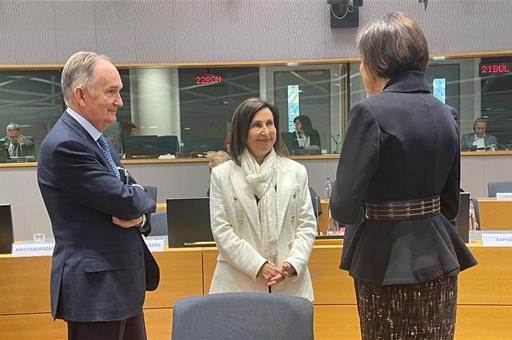The first session was devoted to the EU's support for Ukraine, materialised mainly by the €6 billion mobilised from the European Peace Facility since the beginning of the invasion, and by the EUMAM Ukraine Assistance Mission, which will have trained nearly 20,000 Ukrainian military personnel by the end of this month. The EU is also pushing for options to urgently address Ukraine's ammunition shortages.
Minister Robles reiterated Spain's firm support for these initiatives, and called for "maintaining the joint focus of the fund, so that none of our other areas of responsibility are forsaken, such as attention to the South and the emerging domains identified in the Strategic Compass".
With regard to the EUMAM Ukraine mission, the minister stressed "the global and unwavering support" of our country, and pointed out that Spain is notably contributing to the training and instruction of
Ukrainian fighters on Spanish soil at the Toledo Training Coordination Centre. To this effect, Robles stressed that "all expectations are being exceeded. By way of example, Spain has already trained more than 1,000 Ukrainians and will reach the annual target of 2,000 trained troops well ahead of schedule".
The minister also highlighted the care given to the wounded Ukrainians at the military hospital in Zaragoza: "We have already treated over sixty wounded, and six more are due to arrive", recalling that a few days ago Ukrainian soldiers came to the hospital to receive training in the implantation of prostheses.
During the second session, which focused on current issues, the defence ministers discussed matters such as the recent crisis in Sudan, military missions in the Sahel, cooperation in the Gulf of Guinea and the evolution of Permanent Structured Cooperation (PESCO).
The recent evacuation of people from Sudan was highlighted. In addition to the evacuation of Spanish citizens carried out by aerial means under Special Operations teams of our Armed Forces, there was a subsequent evacuation of European citizens and people of other nationalities, requested by the EU and carried out by the Spanish frigate Reina Sofía.
The Minister for Defence said that this operation highlighted the urgent need for the EU to have the appropriate instruments to deal with this type of crisis. In this regard, Robles stressed that during the Spanish Presidency of the Council of the EU in the second half of this year, the elements envisaged in the Strategic Compass would be promoted, especially the Rapid Deployment Capability, with its first real exercise, and associated with it, the improved Military Planning and Conduct Capability.
In the field of PESCO, the Spanish minister congratulated Denmark on its recent incorporation into the initiative, announcing the organisation of a seminar on PESCO next September within the framework of our presidency.
The meeting concluded with a working lunch with NATO Secretary General Jens Stoltenberg dedicated to open access to strategic domains such as the high seas, space, cyberspace and airspace, which are particularly suitable areas for cooperation between the two organisations. "NATO and the EU play complementary, coherent and mutually reinforcing roles because of their ability to mobilise a wide range of tools," she said.
The next ministerial meeting in this format will take place in Spain in August under the Spanish Presidency of the Council of the EU.
The Foreign Affairs Council in its defence configuration was preceded by a meeting of the governing committee of the European Defence Agency at ministerial level, during which the lessons of the war in Ukraine and its implications for the EU's defence capabilities were discussed.
Non official translation





